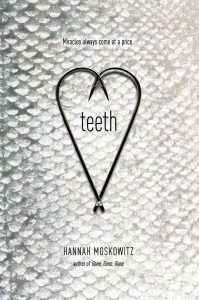 I love books that explore those tough, someone-will-be hurt-no-matter-what-I-do decisions that life throws at us time and again. I especially love when they are books for adolescent readers that pull no punches and make all of the choices hard.
I love books that explore those tough, someone-will-be hurt-no-matter-what-I-do decisions that life throws at us time and again. I especially love when they are books for adolescent readers that pull no punches and make all of the choices hard.
Teeth, by Hanna Moskowitz (Simon Pulse, 2013) is not always an easy read, most especially because it forces the reader to ask tough, ugly questions, ones where every solution feels neither right nor wrong. Moskowitz has created a magically altered corner of our world where right and wrong become hopelessly entangled with want and need and the often-paradoxical dilemma of right for one can be wrong for another, or many others. And by slowly shining a light on how wrong the wrong can be, she draws the reader into complicity with the main character and his choices.
Rudy has been moved to an island by his family in hopes that the magic fish found only in the surrounding waters will heal his younger brother’s cystic fibrosis. Moskowitz sets the stage perfectly, convincingly, populating the island with living proof of the magical cure available through ingesting the fish. It is a miracle that readers will wish actually existed, hope perhaps actually does exist, and yet there is the bit of unease even at the beginning. Because, as the cover says, “Miracles always come at a price.”
As the story begins Rudy is resentful and sullen, feeling trapped on this island without any kids his age, and the slowly dawning revelation that if the fish work, if they actually save his younger brother’s life, it will mean the family – and maybe even Rudy – will have to live there forever. Moskowitz nails that complicated familial tug of war about wanting what is best for the people we love, and also simultaneously wanting what is best for us, when the two cannot equally coexist. And then she layers on additional questions about the good of some versus the good of a few, and issues of violence and exploitation and self-determination.
Rudy meets a girl named Diana, a seemingly easy target of his otherwise bored romantic inclinations. But her connection to the mysteries of the island and his own growing maturity cause him to question his feelings for her. And then Rudy meets a boy who forces him to question everything, including what he even knows about friendship and love.
The fish are a magical cure. But at night, as the waves crash on the shore, there is screaming. Screaming most of the island either ignores or pretends does not exist. But when Rudy meets Fishboy – or Teeth, as the sentient half-boy, half-magic-fish calls himself — he starts down a path that complicates every aspect of Rudy’s life, especially the passive way he has lived to that point.
Teeth is the one screaming, and as Rudy grows to understand and care for Teeth, he begins to unravel secrets that will force him to make choices, the repercussions of which he knows will be real and huge and personal. Choices where someone will certainly lose. Maybe even Rudy. As the book builds to climax it becomes clear there are some things that are simply wrong, but knowing the “right” decision is not always easy. And sometimes there is no “right” but we have to choose anyway.
Some readers may struggle with some of the plot points, especially the explanation for Teeth’s very existence. And for survivors of violence, especially sexual violence, Teeth may be a difficult read. But the shades of scaly, shiny gray layered between the moral and ethical questions Moskowitz weaves within the story will challenge readers to ask, in all the best ways, what would I do?
1 comment for “Shades of Scaly Gray: Teeth by Hannah Moskowitz”